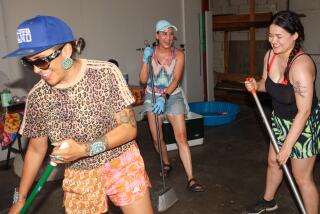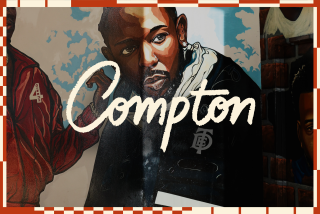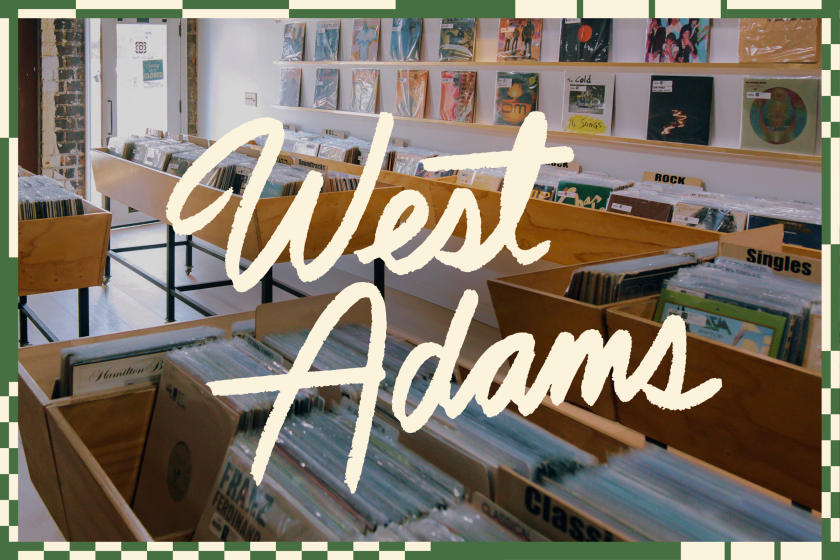Patrons Rescue Oxnard Coffeehouse
Since it opened two years ago, the Cafe on A Street in downtown Oxnard has gained a reputation for dispensing social awareness along with double espressos.
On any given day, local artists can be found mounting bold new exhibits, student activists conversing about social justice, farm-worker advocates planning demonstrations and young hip-hop artists rapping about cultura.
But youthful idealism doesn’t pay the bills. So a couple of months ago, owners Armando Vazquez and Deborah DeVries announced they were shutting down the coffee shop.
Then something unexpected happened. The cafe’s loyal and socially minded customers rallied to save the place they helped transform into a community cultural center. Several people offered to work for free.
As a result, the cafe reopened two weeks ago. With the help of volunteers, operating costs have been reduced by more than half, DeVries said.
“I want to help the community,” said artist and part-time student Virginia Sanchez, 27, who is one of two volunteer managers most committed to the cafe, working five days a week. “I want to make sure students and the [people] can come in here.”
The cafe’s volunteers range from students and teachers to housewives and artists. The coffee shop keeps regular hours in the morning but follows a more flexible schedule in the evenings and on weekends, when community groups who frequent the cafe are in charge of serving drinks.
“I come because of the coffee and the atmosphere,” customer Cuauhtemoc Magana said during the cafe’s recent Sunday menudo breakfast. A carpenter by trade and an aspiring artist at heart, he enjoys the artwork that hangs on the walls, he said.
Passing out copies of an amnesty plan he wrote and sent to President Bush and congressional leaders, the soft-spoken Magana said he is glad the coffee shop is back because the people he meets there inspire him to “get involved.”
A recent schedule of cafe events illustrates what he means. A women’s issues forum met on Saturday, a community breakfast on Sunday, a screening of a Chicano history documentary on Monday, a youth hip-hop show and auditions for a local Spanish-language theater company on Wednesday, a meeting of the Latin American Assn. of Child Care Providers on Thursday and a late-night Latino comedy showcase on Friday.
“We want to prompt social and progressive dialogue, issues of concern to the community,” Vazquez said. “We open it up to anyone with these goals in mind. And if we sell a cup of coffee in the process, then that’s OK too.”
Leaning back in one of the cafe’s mismatched chairs, Vazquez said he and DeVries quickly envisioned such a place when they met 12 years ago at a bilingual educators’ conference in Los Angeles.
Vazquez lives in Ventura with his wife and two teenage children. When he isn’t at the cafe, he teaches various subjects, including English at Santa Clara High School, business courses at a UC Santa Barbara extension center, children’s art for the county and job skills for women’s drug and alcohol recovery centers.
DeVries lives in Malibu and teaches English, creative writing, art, English as a second language, general equivalency diploma courses and job skills for Oxnard College, Ventura College, women’s drug and alcohol recovery centers and the city of Oxnard. Both educators describe themselves as social activists fed up with how “most people just talk about things and they don’t have any solutions,” DeVries said.
They opened the coffee shop in 1999 because they needed a neutral meeting place to teach GED classes to youths in rival Oxnard gangs. The coffee bar also gave them an instant job-skills training site for the youths, a few of whom have moved on to Oxnard College, DeVries said.
They eventually named the art gallery after Rudy F. Acuna, a longtime professor of Chicano studies at Cal State Northridge. They also painted the walls bright pink, stocked hundreds of books to loan out, then invited local artists and started pouring coffee.
What happened next was beyond their expectations, DeVries said. The discussions people were having at the coffee shop renewed the locals’ faith in culture as a source of strength and knowledge.
“The cafe is the realization of a dream,” DeVries said. “So many people who walk in get the hope that you can be creative and have a place to do what we did in the ‘60s. We can change the world.”
Some nights, comics and deejays use the coffee shop’s stage to address racism. Farm workers hold potlucks to map out strategies to increase their rights. Gang members learn job skills. Students hold study groups.
“It’s a great place to gather,” said West Hills artist Cyndi Hidalgo-Knies, whose paintings are on display.
Vazquez said the coffee shop is purposely located in the ombligo, or bellybutton, of the city that officials have touted as the center of downtown revitalization.
With its blackboards announcing coffee and menudo overshadowed by giant hand-painted banners of beret-wearing Chicano activists with fists of protest high in the air, the coffee shop stands out on the block that is also home to the Oxnard Police Department and Downtown Oxnard Merchants Assn.
The cafe is moving toward a more permanent operating structure, with a percentage of profits going toward the volunteers and the rest being used for rent and maintenance costs, Vazquez said.
Not too much coffee is being sold yet, he said.
But for now the plan is clear. “The doors will stay open,” Vazquez said.
More to Read
Eat your way across L.A.
Get our weekly Tasting Notes newsletter for reviews, news and more.
You may occasionally receive promotional content from the Los Angeles Times.









